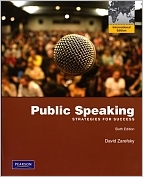| |||||
• polskie
• Zamów informacje o nowościach z wybranego tematu • kontakt |
PUBLIC SPEAKING: STRATEGIES FOR SUCCES INTERNATIONAL EDITIONZAREFSKY D.wydawnictwo: PEARSON ED., 2010, wydanie VIcena netto: net price + 5% vat. As one of today's leading scholars in speech communication, David
Zarefsky's revised edition offers "rhetorical workout" boxes to increase skills
development, updated information technology to connect the theories and concepts of public
speaking to everyday life and a "student's view" box so that students can learn
from their peers. Table of Contents
PART I: Foundations of Public Speaking
1. Welcome to Public Speaking Why Study Public Speaking? Public Speaking and Communication The Public Forum The Rhetorical Situation Ethics: Respect for Audience, Topic and Occasion 2. Your First Speech Goals and Strategies for Your First Speech Strategies for Organizing Your Speech Outlining Your Speech Practicing Your Speech Presenting Your Speech Strategies for Overcoming Speech Anxiety 3. Presenting the Speech Characteristics of Effective Presentation The Voice in Presentation The Body in Presentation Modes of Presentation Practicing for Speech Presentation 4. Listening Critically Are You Really Listening? Strategies for Careful Listening Listening Critically Evaluating Speeches Critically
PART II: Invention and Development of the Speech
5. Analyzing Your Audience Checking Audience Demographics Respecting Audience Cultures Understanding Audience Psychology Strategies for Analyzing the Audience Analyzing Your Own Ethos
6. Choosing a Topic and Developing a Strategy What Makes a Good Topic? How to Choose a Good Topic Developing a Strategic Plan Developing the Purpose Statement and the Thesis Statement Analyzing the Thesis Statement 7. Researching the Speech Strategic Perspectives on Research Types of Supporting Material Tools for Locating Supporting Material Sources of Supporting Material Evaluating Evidence A Plan for Research Note Taking and Filing 8. Reasoning Proof, Support, and Reasoning Example Analogy Signs Cause Testimony Narrative Avoiding Errors in Reasoning Reasoning in Public Speaking PART III: Arrangement and Style in the Speech
9. Organizing the Speech: The Body Why is Organization Important? Selecting the Main Ideas Arranging the Main Ideas Selecting and Arranging Supporting Materials 10. Organizing the Speech: Introductions, Conclusions, and Transitions Introductions: Beginning the Speech Conclusions: Ending the Speech Transitions: Connecting the Elements of a Speech 11. Outlining the Speech From Ideas to Outline The Preparation Outline Sample Preparation Outlines The Presentation Outline Sample Presentation Outline
12. Achieving Style through Language What is Style? Defining Terms Appropriately Achieving Clarity, Rhythm, and Vividness Style and the Entire Speech Achieving Good Style
PART IV: Uses of Public Speaking
13. Informing Planning Your Strategy Informative Strategies Encouraging Retention 14. Persuading Purposes for Persuasive Strategies Plan Your Strategy The Elaboration Likelihood Model Constraints on Effective Persuasive Speaking Strategic Resources for Specific Purposes General Strategic Resources Organizing Persuasive Speeches 15. Speaking with Visual Aids Benefits of Using Visual Aids Types of Visual Aids Visual Aid Media Preparing Visual Aids Using Visual Aids in the Speech 16. Occasions for Public Speaking Fitting Your Speech to the Occasion Deliberative Speaking Ceremonial Speaking Speeches Combining Deliberative and Ceremonial Goals Appendix: Speeches for Analysis and Discussion 496 pages, Paperback Księgarnia nie działa. Nie odpowiadamy na pytania i nie realizujemy zamówien. Do odwolania !. |


